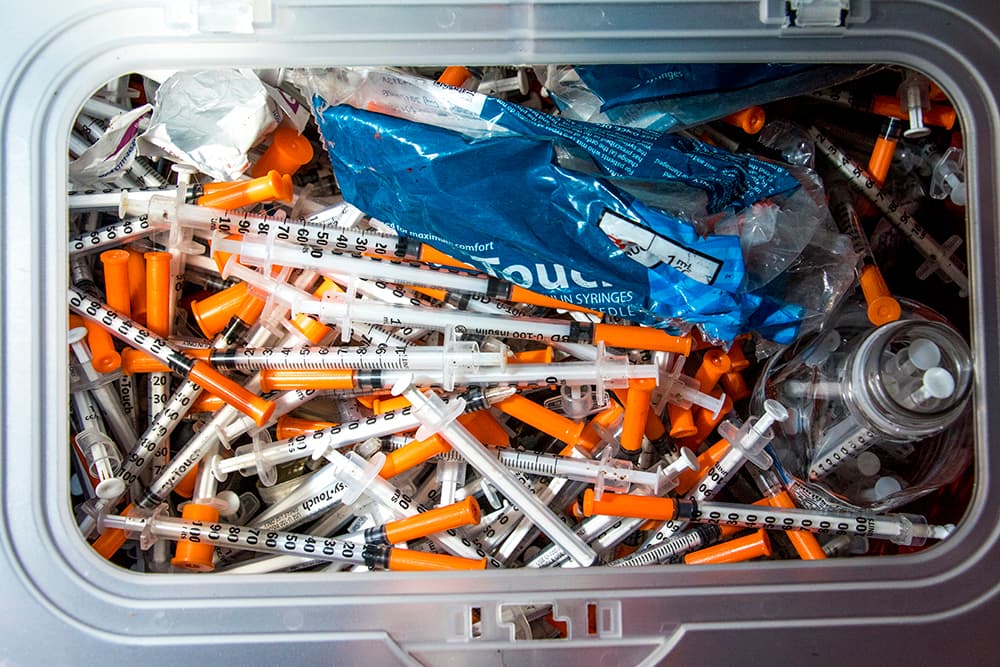Update 1/14 at 7:00 p.m.
Mayor Mike Johnston vetoed the bill Tuesday, saying it was the "wrong solution at the wrong time”.
Our original story continues below.
Denver may soon make it easier to open “needle exchange” facilities where people who inject drugs can trade dirty syringes for clean ones.
Denver City Council voted 8-5 Monday to pass an ordinance changing the rules. The change now awaits a signature from Mayor Mike Johnston.
Currently, only three needle exchanges — which are different from supervised injection sites — are allowed to operate in the city.
Two of the three approved needle exchange sites are currently operating as fixed sites. They are the Harm Reduction Action Center in Capitol Hill and Colorado Health Network’s Access Point in North Capitol Hill. The third approved site is a mobile exchange operated by Vivent Health.
Though needle exchange sites are not allowed to operate within 1,000 feet of schools and daycares, all three sites do, as they qualify for exemptions to the law. Those rules were established in a 1997 ordinance, which included a limit of three exchanges in the city.
Critics of the current policy restrictions, including bill sponsors Stacie Gilmore, Serena Gonzalez-Gutierrez and Sarah Parady, argue they limit access to vital harm reduction and overdose prevention resources during a time when overdoses are rising in Colorado.
The new ordinance allows for unlimited needle exchange sites, with no restrictions about where they’ll open
The changes made by Bill 24-1791 are simple: it will remove the limit to how many needle exchange programs and allow them to open within 1,000 feet of schools and day care without the need for exemptions. The change was recommended by the Denver Department of Public Health and Environment.
Language was also added to the ordinance to require “good neighbor agreements” between needle exchange sites and nearby neighborhood groups to create a collaborative relationship between the two parties.
Councilmember Serena Gonzales-Gutierrez said passing the bill is critical to expanding addiction support across Denver.
“It is about showing some humanity and compassion and that we know people who are suffering from this disease live and exist all around us, and we cannot pretend that they do not exist or that the issues that they are dealing with do not exist and that their lives are not worthy,” she said.
Several organizations, like Denver Health, 5280 High School, and the National Institute on Drug Abuse supported the ordinance.
Council members who voiced their opposition to expanding needle exchange programs, like District 2 councilmember Kevin Flynn, said they approve of the existence of needle exchange programs, but do not support removing the 1,000 foot limit.
“I don't want my constituents calling me up while I'm retired and say, ‘Why did you do that?’” Flynn said.
Council members Flynn, Amanda Sawyer, Darrell Watson, Diana Romero Campbell and Flor Alvidrez all voted against the ordinance.
Needle exchange sites are not supervised injection sites
During general public comment, several people spoke out against the bill, however, most mischaracterized it as one that would expand legal injection sites, which is not legal in Denver or the state.
In supervised injection sites, drug users are allowed to use illicit drugs under medical supervision. The concept has failed to gain widespread legalization across states. In addition to providing access to clean needles and a place to dispose of used needles, needle exchange programs also provide addiction support, behavioral health care, and STI testing.
The Centers for Disease Control say that needle exchange sites are “proven and effective community-based prevention programs”.
While the bill has passed through City Council, it may get vetoed by Mayor Mike Johnston, who expressed skepticism about the expansion to the Denver Post.
“We believe there is an adequate supply of needle exchange programs to meet the current demands,” a spokesperson for his office told the Denver Post. “We will continue to focus our efforts on increasing access to the desperately needed in-patient and out-patient treatment options that help people recover.”
If Johnston vetoes the bill, City Council can overrule his veto if nine members vote to do so. Based on Monday’s outcome, that would require one council member to flip their vote.











